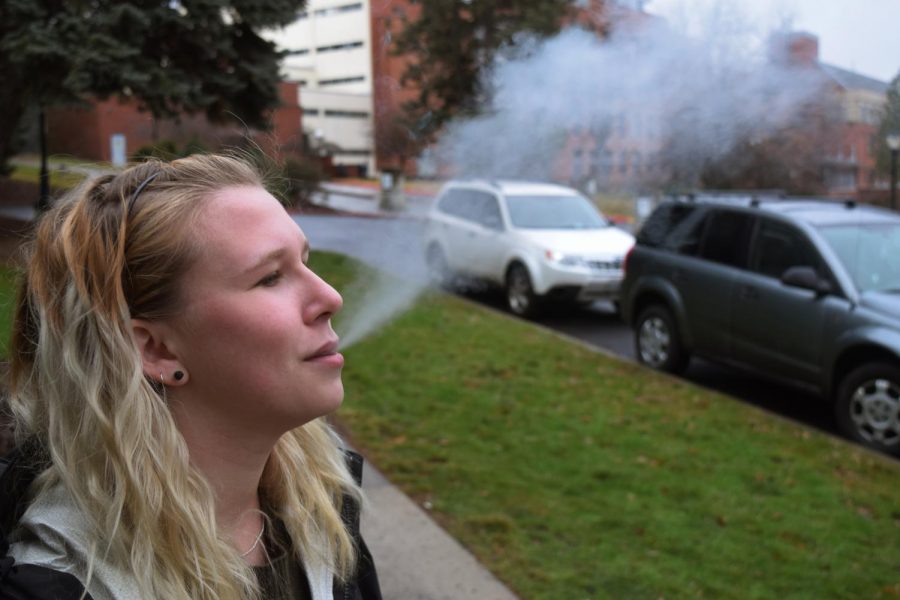Smoking ban doesn’t allow freedom of choice
Campaigns should approach smoking from a nonjudgmental perspective
MICHAEL LINDER | THE DAILY EVERGREEN
Dasha Winterer, junior astrophysics major, explains how she doesn’t think students should be banned from smoking on campus.
January 30, 2018
After WSU updated its Smoking, Tobacco and Nicotine Use Policy the campus became smoke-free for employees, students and visitors. Smoking bans target freedom of choice, selectively limiting rights while discouraging individuals from exercising personal responsibility. This creates a sense of powerlessness.
According to the Washington Administrative Code, “smoking or other tobacco usage is not permitted within the perimeter of WSU Pullman property. Smoking material must be extinguished and disposed of prior to entering WSU property.”
Support for the ban was inharmonious. A survey from the Tobacco Free Advisory Task Force back in 2014 showed that while 67 percent of respondents were supportive of a tobacco-free campus, 57 percent of graduate and professional students opposed the ban.
In addition to prohibiting smoking, the WAC bans all forms of smokeless tobacco, including chewing tobacco, snus and snuff. The ban even includes products that don’t contain tobacco, like e-cigarettes and vapor products.
“Vape smoke is different,” said sophomore architecture major Lydia Sinay. “I don’t see why it’s included in the ban.”
Since these products cause little to no harm to the environment or others, they should be permitted. While the university might have the right to implement such policies, “they cannot control people’s habits,” junior astrophysics major Dasha Winterer said.
Forbidding legal substances, for the reason that it may be unhealthy to the user, sets a dangerous precedent that pushes an ideological agenda.
“Ultimatums and bans don’t work,” Winterer said. “Think about prohibition. Banning smoking is just going to make people break rules.”
Bans should serve to protect the general public from smoke exposure, not demonize the act of smoking. Such policies raise questions about the ethics of denormalization strategies that shame smokers. Campaigns should acknowledge the effects of smoking from a non-judgmental standpoint, valuing tolerance of people’s lifestyles and individual preferences.
Bans stigmatize people who choose to smoke, marking them as social deviants. They outcast and drive individuals off campus, which can be dangerous at night and during extreme weather conditions.
“We have to hide in order to have a smoke between classes,” Sinay said.
Bans might be helpful in promoting smoking prevention and cessation, but they come at the smokers’ expense. Denormalization has made it difficult to smoke at all, forcing smokers to either quit or suffer the consequences.
As long as smoking is legal, it should be allowed on campus and permitted in controlled settings.
“If there are no areas to smoke, smokers will smoke wherever they want,” Winterer said.
Restrictive smoking policies are feasible alternatives to outright bans. Designating specific areas in accordance with public smoking laws would limit exposure while creating a space for smokers, with clean air remaining the first priority.
Editor’s note: This column has been updated from its original version.










